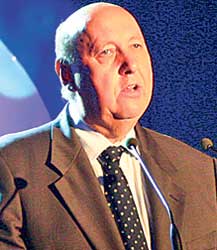
President vs. SriLankan: Why Hill is wrong - Point of viewA short article written by J.C. Weliamuna that was published in The Sunday Times of December 23 begs a reply in the public interest; given the potential such an article wields to seriously mislead the uninformed public. This reply will contain a brief yet an adequate elucidation of the Rule of Law tailored to fit the context in which the issue was raised by Mr. Weliamuna. Further more, with all due respect, this shall move on to demolish the arguments advanced by Mr. Weliamuna to condemn the course of action pursued by the government on the Peter Hill issue. In Mr. Weliamuna's eyes, the presidential request to be accommodated in the national carrier by off-loading its passengers amounted to a blatant disregard to the Rule of Law, which according to him, rigidly says that no one is above the law, and all are equal before it irrespective of rank or status.
Here he errs by stubbornly clinging on to an archaic principle without paying due recognition to the context it was laid down, its exceptions and practical reality. The predominant and most influential theory on the Rule of Law is put forth by A.V. Dicey. However. we must appreciate his view against its background. When Dicey said, 'All are equal before the law', he was denouncing the French system of having special courts to deal with complaints against public officials. He thought this would unduly favour the government over the citizenry. Therefore it would be folly to interpret Dicey as requiring that there be actual equality in terms of legal rights and powers. Further more, Constitutional Law expert Ivor Jennings opines that no two citizens are equal and they all have special duties and powers by virtue of belonging to a certain category. This, infact, is an accurate view given that Members of Parliament and diplomats enjoy certain privileges not available to an average citizen. The supreme constitution itself grants the Head of State certain privileges such as freedom from prosecution, thus placing the president above the law. According to Mr. Weliamuna's understanding of the Rule of Law, the Constitution must be a flawed document for it does not recognize his most rigid interpretation of the Rule of Law. The above shows how legal rights and powers of individuals vary depending on their rank and status, and how much the reality could be distorted by a superficial understanding of the Rule of Law. Mr. Weliamuna's next assertion is that Mr. Hill had taken his decision in the best interest of SriLankan, and by doing so, had complied with the standards of professionalism expected of him. He further goes on to say the removal of Mr. Hill's work permit is not in the best interest of the country, and the government's conduct amounts to corruption and an abuse of power. Here, it should be noted that the government is the majority shareholder of Sri Lankan given that it owns 51% of its shares. Therefore, it is only natural to give recognition to its will, especially since the time period in question was politically most sensitive and demanded that the President be in the country. However the majority shareholder's will was not recognized by Mr. Hill, and he yielded to at most, a minority shareholder's will, if not his fancy. Now where is the democracy in that Mr. Weliamuna? Mr. Weliamuna seems to be of the view that the economic interests of the 'national carrier' must come before the interest of the state. I beg to differ. If that is the case, then I must say that there is nothing 'national' about this carrier, and it is just another 'carrier' among many others. Further, tolerance of Mr. Hill's conduct could set a most unhealthy precedent for the future. An organization must give due recognition to the needs of the state, and when the state is the dominant investor of such an organization; it has a right to expect that it will be given priority. And when these fundamentals are not met with, the state out of necessity must assert its authority and remedy the insolence shown, for inaction by the state could be interpreted as the state indirectly authorizing conduct that is detrimental to the national interest. Thus, the course of action taken by the government to uphold good governance is most appropriate. On this basis I disagree with Mr. Weliamuna. (The writer holds a law degree from the University of London) |
|| Front
Page | News | Editorial | Columns | Sports | Plus | Financial
Times | International | Mirror | TV
Times | Funday
Times || |
| |
Reproduction of articles permitted when used without any alterations to contents and the source. |
© Copyright
2007 | Wijeya
Newspapers Ltd.Colombo. Sri Lanka. All Rights Reserved. |
